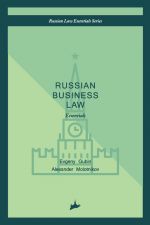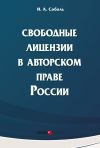Правообладателям!
Представленный фрагмент книги размещен по согласованию с распространителем легального контента ООО "ЛитРес" (не более 20% исходного текста). Если вы считаете, что размещение материала нарушает ваши или чьи-либо права, то сообщите нам об этом.Читателям!
Оплатили, но не знаете что делать дальше?
Текст бизнес-книги "Russian business law: the essentials"
Автор книги: Evgeny Gubin
Раздел: О бизнесе популярно, Бизнес-книги
Текущая страница: 3 (всего у книги 8 страниц)
In addition to the codes which contain most general norms, the activities of the entrepreneurs in Russia are also regulated by the federal laws. Some of them are listed below:
i) The Federal Law on Joint Stock Companies,
ii) The FL on Limited Liability Companies,
iii) The FL on Registration,
iv) The FL on Advertising,
v) The FL on Licensing,
vi) Foreign Investment Law.
Sometimes, the word «legislation» does not only refer to laws, but also to any other legal acts. For example, Clause 6 of Article 1 of the Tax Code of the RF directly states: “The laws and other normative legal acts which are referred to in this Article shall hereafter in the text of this code be referred to as ‘tax and levy legislation.’ ”
Moreover, it is necessary to remember that legal acts such as the “On Railway Transport Charter of the Russian Federation,” (RTC) and the “The Charter of Motor and Urban Surface Electric Transport,” (MUSETC) are also federal laws, despite the existence of the word «charter» in their names. This type of a legal act as the charter, does not exist in Russia, whereas this word sometimes occurs in names of various acts (not only in federal laws). When determining the legal nature of a legal act, it is always necessary to refer to its type (federal law, decree, decision, etc.) and the adopting body thereof (The President of the RF, the Government of the RF, etc.). This determination is not made by the name of the legal act.
5. The Subordinate Legislation
5.1. Subordinate Legal Acts of Public AuthoritiesThe legal acts of the President of Russia follow federal laws in the hierarchy of legal acts. The acts of the President of Russia should not contradict to the Constitution of Russia and the federal laws (part 3 of Article 90 of the Constitution of Russia).
The president of Russia issues acts of two types: decrees and orders.[21]21
Additionally, this type of an act of the President of Russia as an assignment/order has recently been widely adopted. The orders of the President do not contain norms obligatory for legal entities and citizens. These documents contain provisions obligatory for subordinate governmental authorities reflecting, as a rule, the most accurate directions of the development of the legislation and the state policy in general. An understanding of some orders of the President of Russia can be useful for entrepreneurs.
[Закрыть] As a rule, orders, unlike decrees, do not possess a normative character. Currently, the President of Russia has issued a few acts which regulate entrepreneurial activities.
The Government of Russia issues decisions and orders. They should not contradict the Constitution of Russia, federal laws, and decrees of the President of Russia (Article 115 of the Constitution of the Russian Federation).
The federal ministries adopt acts (generally those are commands and orders), on the basis and in accordance with the Constitution of Russia, the federal laws, the acts of the President and the Government of Russia.
In the Russian Federation, all federal executive authorities, except for the Government of Russia and the Ministries, are two types: agencies and services. Agencies carry out the functions of providing state services, of management of the state property, and law-enforcement functions. The main function of the services is the exercising of control and supervision in the established field of activity. Both agencies and services issue law-enforcement acts, as well as normative legal acts in certain cases.
Federal agencies and services issue a large number of legal acts, which regulate some issues of entrepreneurial activities in detail.
5.2. Other Subordinate Legal ActsApart from government bodies, the power of adoption of obligatory acts in Russia is possessed by such formations of sui generis, including:
The CBR carries out the regulation of banking activities, the financial markets, monetary, and currency regulation. Thus, the Bank of Russia in particular establishes the rules of the implementation of calculations within the Russian Federation, rules on carrying out banking operations, exercises regulation, control, and supervision in the sphere of the corporate relations in joint stock companies, defines the procedure of calculations with international organizations, foreign states, as well as with legal entities and individuals.
On matters relevant to the CBR Law and other federal laws, the Bank of Russia issues normative acts in the form of orders, rules, and instructions that are obligatory for federal public authorities, public authorities of the subjects of the Russian Federation, local authorities, individuals, and all legal entities.
State corporations, being structures of sui generis, can be provided with various powers, including powers on the adoption of normative legal acts (see, for example, Article 8 of FL on Rosatom).
Thus, Rosatom State Corporation on Atomic Energy adopted an order No. 1/19-NPA (as of December 6, 2013), which stipulates the obligatory forms of reports in the field of state registration and control over radioactive materials and radioactive waste, as well as the order and terms of providing reports.
6. Acts of the Subjects of the Federation
So far we have addressed only the federal legislation, that is the acts which are adopted by government authorities at the level of the federation. The subjects of the Russian Federation have the right to adopt legal acts on the matters listed in Article 72 of the Constitution, as well as on any other matters, except for those listed in Article 71 of the Constitution.
Russia is an asymmetric federation; it is composed of different types of subjects. There are six such types in total: the republics (the republic is a name of the subject of a part of Russia), the territories, the regions, the cities of federal importance, the autonomous region, and the autonomous areas. The subjects of all types possess almost identical legal status.
There are three cities of federal importance in Russia: Moscow, St. Petersburg, and Sevastopol. The aforementioned cities are separate subjects of the federation and, respectively, their bodies adopt legal acts of regional level.
6.1. The Competence of the Subjects of the FederationAccording to Article 72 of the Constitution of the RF, the subjects of federation can adopt legal acts, particularly on the following matters:
i) possession, use and disposal of land, subsoil, water and other natural resources;
ii) demarcation of state property;
iii) nature utilization, protection of the environment and ensuring ecological safety; specially protected natural territories;
iv) establishment of common principles of taxation and levies in the Russian Federation;
v) administrative, administrative procedure, labor, family, housing, land, water, and forest legislation; legislation on subsoil and environmental protection.
Moreover, subjects of the federation can adopt legal acts on any other matter, except for those listed in Article 71 of the Constitution of the RF.
6.2. The System of Acts of the Subjects of FederationThe system of legal acts of each subject of the federation also represents a pyramid, at the top of which is the charter or the constitution of the subject.
Thereafter, the laws of the subject of federation are located. The laws of the subjects often play an important role in the legal regulation of entrepreneurial activities in the given region. Thus, in many subjects, separate laws (codes) on administrative offenses are adopted. These laws provide sanctions for offenses. Moreover, the laws of the subjects establish the structures of administrative offenses which are not provided by the Code of Administrative Offences of the RF.
Such an act in Moscow is the Law of Moscow city No. 45 (as of November 21, 2007), "The Code of the City of Moscow on Administrative Offenses." In particular, it provides liability for such offenses, such as:
i) the implementation of small retail trade without documents confirming the right to placement of trade objects;
ii) illegal destruction of green plantations;
iii) excess in terms of design of the objects, and other excesses.
Moreover, in many subjects of the federation, legal acts are adopted with the purpose of supporting of small and medium businesses. The Law of City of Moscow No. 60 (as of November 26, 2008), "On Support of Small and Medium Businesses in the City of Moscow," is such an act in Moscow. This law regulates, in particular:
i) the procedure for providing to the subjects of small and medium businesses property, financial, information, consulting, legal, and other types of support (chapter 4 of the law);
ii) the procedure for rendering additional support to the subjects of small and medium businesses, which are carrying out activities in the field of innovation, industrial production, and other spheres (chapter 6 of the law).
The subjects of the federation adopt another set of laws, somehow affecting the interests of entrepreneurs.
The highest official is the head of the subject of the federation. In Moscow, the highest official is the mayor of Moscow. The legal acts adopted by the Mayor of Moscow (decrees) can not contradict the charter and the laws of the city of Moscow (part 8 of Article 41 of the Charter of the city of Moscow).
Other public authorities of subjects of the federation are the highest executive body of the public authority, as well as various departments, commissions, and similar bodies.
In Moscow, the highest executive body of the power is the Government of Moscow. Decisions and orders of the Government of Moscow can also affect the interests of businesses.
Other bodies of the city of Moscow, such as the Department of Trade and Services, can also adopt acts, which are significant for representatives of businesses.
Finally, in the administrative districts and areas of the city of Moscow, territorial authorities of executive power are formed – this includes the prefecture of administrative districts and councils of areas, which also adopt acts that are obligatory for execution.
7. The Municipal Acts Regulating Entrepreneurial Activities
Acts at the municipal level in the Russian Federation are also built in a certain hierarchy. The charter of municipality stands at the top of the system, the acts of the representative body (local parliament) are located a step below, the acts of the head of municipality are another step below, and finally the acts of other authorities are at the lowest level.
8. Customs
A special source of law in Russia is customs. The custom "is a rule of conduct which has taken shape and is widely applied in a certain sphere of business and other activities, and which has not been stipulated by legislation, regardless of whether it has or has not been fixed in any one document," (Clause 1 of Article 5 of the Civil Code of the RF). The customs cannot contradict the norms of legislation or provisions of contracts (Clause 2 of Article 5 of the Civil Code of the RF). In Russia, customs are sources of civil law only.
9. The Judicial Practice
The legal system of the Russian Federation belongs to the Continental (Roman-German) type. One of the consequences of this system is that there are no judicial precedents in Russia: the courts are obliged to make decisions, being guided by laws and other legal acts, but not by other judicial decisions. The courts can not create new legal norms.
In practice, one should consider the following:
i) The generalization of judicial practice
The highest instance of the judicial system of Russia is the Supreme Court of the RF.[22]22
The Supreme Court of Arbitration of the RF, which previously headed the system of arbitration courts, became part of the Supreme Court of the RF. For details, please, see Chapter on Litigation, Arbitration and Other Means of Legal Protection.
[Закрыть] The Supreme Court of the RF is given the right to make explanations to inferior courts, concerning judicial practice on matters, with the basis of study and generalization (Clause 1 part 7 of Article 2 of FCL on Supreme Court of the RF). Such explanations are given in the decisions of the Plenum of the Supreme Court of the RF,[23]23
The Plenum of the Supreme Court of the RF is a part of the Supreme Court of the RF.
[Закрыть] and informational letters of the Supreme Court of the RF.
In the decisions of its Plenum, the Supreme Court of the RF, expresses positions on the most important issues, as well as on those problems regarding which there were serious contradictions among inferior courts (for the purposes of correcting such contradictions and making the practice uniform).
Informational letters are descriptions of concrete cases; a short narrative of the court decisions made on the given cases, and the comments of the Supreme Court of the RF concerning whether the inferior court adjudicated the case correctly or not.
It should be noted that the Decisions of the Plenum of the Supreme Court of the RF, and the information letters of the Supreme Court of the RF, are the result of the generalization of judicial practice, and not the revision of the decision of the inferior court.
However, while interpreting a norm in the decisions of the Plenum the Supreme Court of the RF, it sometimes gives a meaning which is absolutely different from the one resulting from the literal interpretation of the writing.
Formally, the positions stated in the decisions of the Plenum of the Supreme Court of the RF and the information letters of the RF are not obligatory for other courts. However, in practice the situation is very different. The inferior courts strictly follow the decisions of the Supreme Court of the RF, therefore the specified acts have an obligatory character. Thus, the Supreme Court of the RF can actually change the meaning of this or that norm, and sometimes change it quite substantially.
ii) References to the court decisions on analogue cases
While preparing a position on a specific case, it is recommended to refer (whenever possible) to the court decisions on analogue cases. The judges listen to such arguments, and even in the final decision on the case, they sometimes indicate how a similar dispute was previously solved by another court. Moreover, the references should be made to the decisions of the Supreme Court of the RF, the courts of the subjects, and the arbitration courts of cessation. The court decisions, standing below, are seldom cited as an example. Practice shows that the party, whose position is supported with the court decisions on analogue cases, has a much better chance of winning the case.
Thus, while studying any aspect, one should analyze not only the federal laws and other legal acts, but also the acts of the courts on relevant issues.
Evgeny Arkhipov[24]24
Lomonosov Moscow State University, PhD candidate, LL. B. 2014.
[Закрыть]
Chapter 2 – Business Association Forms
1. Persons Conducting Entrepreneurial Activities
1.1. Entrepreneurial ActivitiesThe Civil Code of the Russian Federation includes the following definition of entrepreneurial activities: "independent activity, performed at one's own risk, aimed at systematically deriving a profit from the use of the property, the sale of commodities, the performance of work, or the rendering of services by the persons, registered in this capacity in conformity with the law-established procedure," (Clause 1 of Article 2 of the CC of the RF). Judicial practice clarifies the given definition. Thus, on February 24, 2004 Constitutional Court of the Russian Federation rendered decision No. 3-P on the matter of the verification of the constitutionality of separate provisions of Articles 74 and 77 of the Federal Law on Joint Stock Companies, regulating the consolidation order of the placed stocks of a joint stock company and redemption of fractional shares. This decision was related to the complaints of citizens and the “Cadet Establishment” company, and as per the inquiry of Oktyaberski District Court of the city of Penza, specified the following:
The right to free use of one’s abilities and property for entrepreneurial and other economic activities, not forbidden by law, serves as a basis for constitutional legal status of the participants of business companies, in particular of shareholders of joint stock companies being legal entities, as well as natural persons, including those who are not entrepreneurs, and who exercise their rights through holding stocks, certifying the rights to obligation of its owners, towards the joint stock company.
Proceeding from the aforementioned position of the Constitutional Court of the Russian Federation, the activities of shareholders shall be recognized as entrepreneurial.
1.2. The Right to Engagement in Entrepreneurial ActivitiesNatural persons (people) and legal entities (organizations) can be engaged in entrepreneurial activities in Russia.
Another name given to natural persons in Russian law is “citizens.” One should take into account that in civil and business legislation the word «citizens» means all "natural persons," and not only the citizens of the Russian Federation. While referring to citizens of Russia, one shall specifically indicate this, by saying "citizens of the Russian Federation." The word «people» in the civil and business legislation is not used.
Every person can be engaged in entrepreneurial activities in Russia. Such right is fixed in the Constitution of the RF under Clause 1 of Article 34.
It is important to note that there are exceptions to this rule. The primary exceptions are related to the legal capacity of citizens, e.g. the ability of citizens to acquire and exercise civil rights by their actions, to create civil duties for themselves and perform those duties. The legal capacity of citizens is defined by the CC of the RF. As a general rule, citizens gain full legal capacity at 18 years of age. Before reaching this age, citizens cannot independently exercise most transactions.
Profit organizations[25]25
See Section 3.3 of the present chapter for the classification of legal entities.
[Закрыть] have the right to be engaged in entrepreneurial activities. Non-Profit organizations may conduct income generating activities, as long as this is established in their charters, and only to the extent that this serves the purposes for which they have been established, and corresponds to such purposes (Clause 4 of Article 50 of the CC of the RF).
State and municipal organs (being expressly authorized), participate in civil legal relations on behalf of the Russian Federation, its subjects, and the municipalities. State authorities can be legal entities (see, for instance, clause 15 of the Rules on the Ministry of Justice of the Russian Federation, approved by Decree No. 1313 of the Russian President, dated October 13, 2004).
The Russian Federation, its subjects, and municipalities do not exercise entrepreneurial activities.
2. Individual Entrepreneurs
2.1. Registration as an Individual EntrepreneurThe citizen conducting entrepreneurial activities must be registered as an individual entrepreneur (Clause 1 of Article 23 of the CC of the RF). The registration procedure is regulated by the Federal Law on Registration. The Federal Tax Service (hereinafter FTS) of Russia is the body carrying out the state registration of individual entrepreneurs. For the purposes of being registered, the citizen needs to inform the FTS of Russia of his/her place of residence (Clause 3 of Article 8 of the Federal Law on Registration). The set of documents required for submission to the territorial body of the FTS of Russia, is indicated in Clause 1 of Article 22.1 of the Federal Law on Registration.
The absence of state registration shall result in administrative or criminal liability for illegal entrepreneurship. Moreover, despite the absence of registration, entrepreneurial activities of the citizen can be regulated by the norms of the CC of the RF. These norms are also applicable to individual entrepreneurs and legal entities who are already registered (Clause 4 of Article 23 of the CC of the RF).
2.2. Status of an Individual EntrepreneurThe activities of individual entrepreneurs are regulated by the same norms which establish rights and duties for commercial organizations. A possible exception is in a case when the law states otherwise, or based on the nature of the individual entrepreneur.
Правообладателям!
Представленный фрагмент книги размещен по согласованию с распространителем легального контента ООО "ЛитРес" (не более 20% исходного текста). Если вы считаете, что размещение материала нарушает ваши или чьи-либо права, то сообщите нам об этом.Читателям!
Оплатили, но не знаете что делать дальше?






